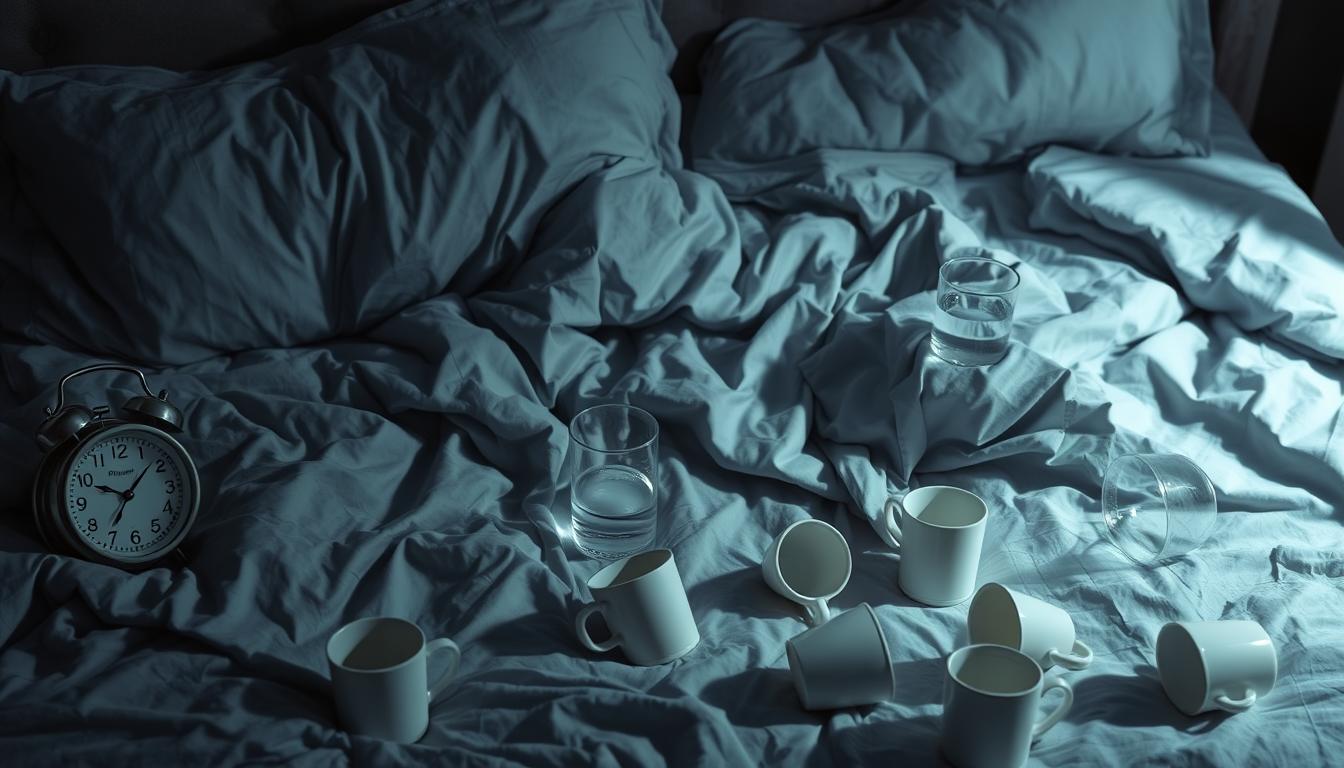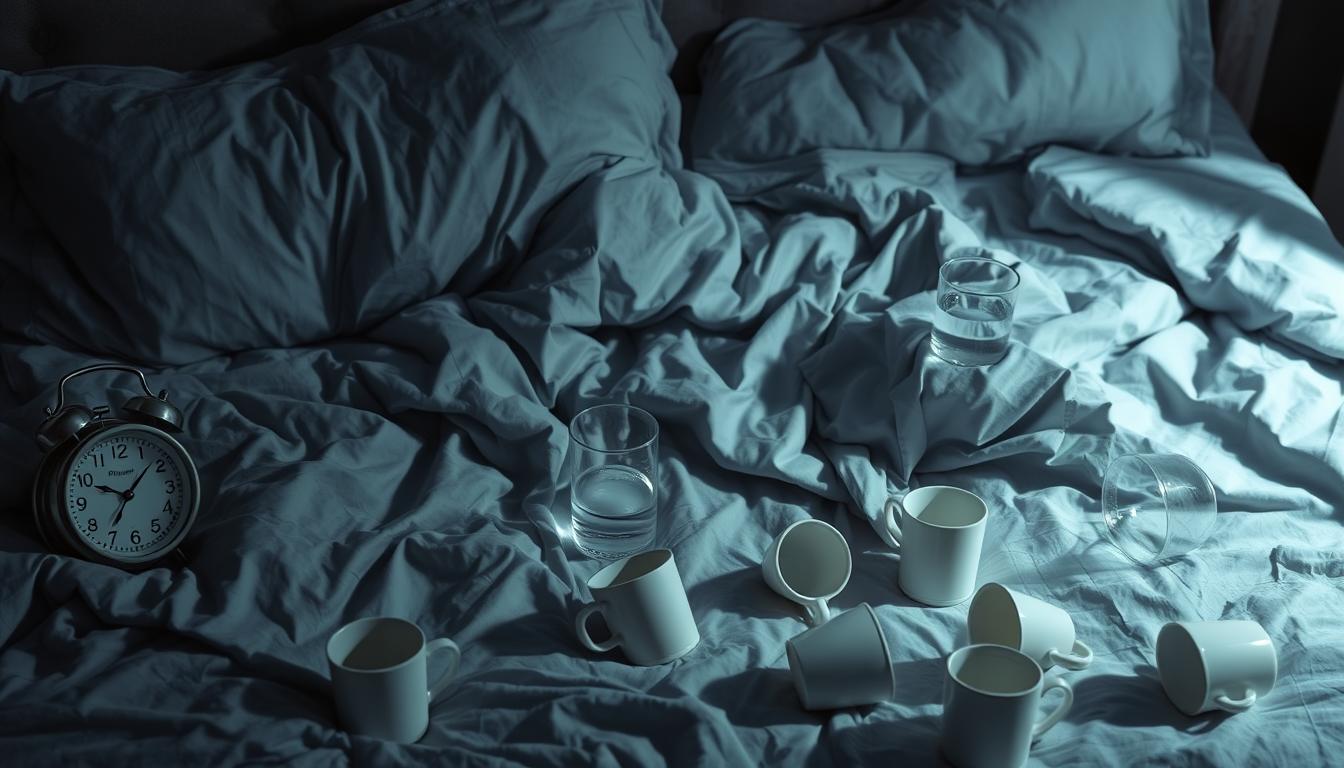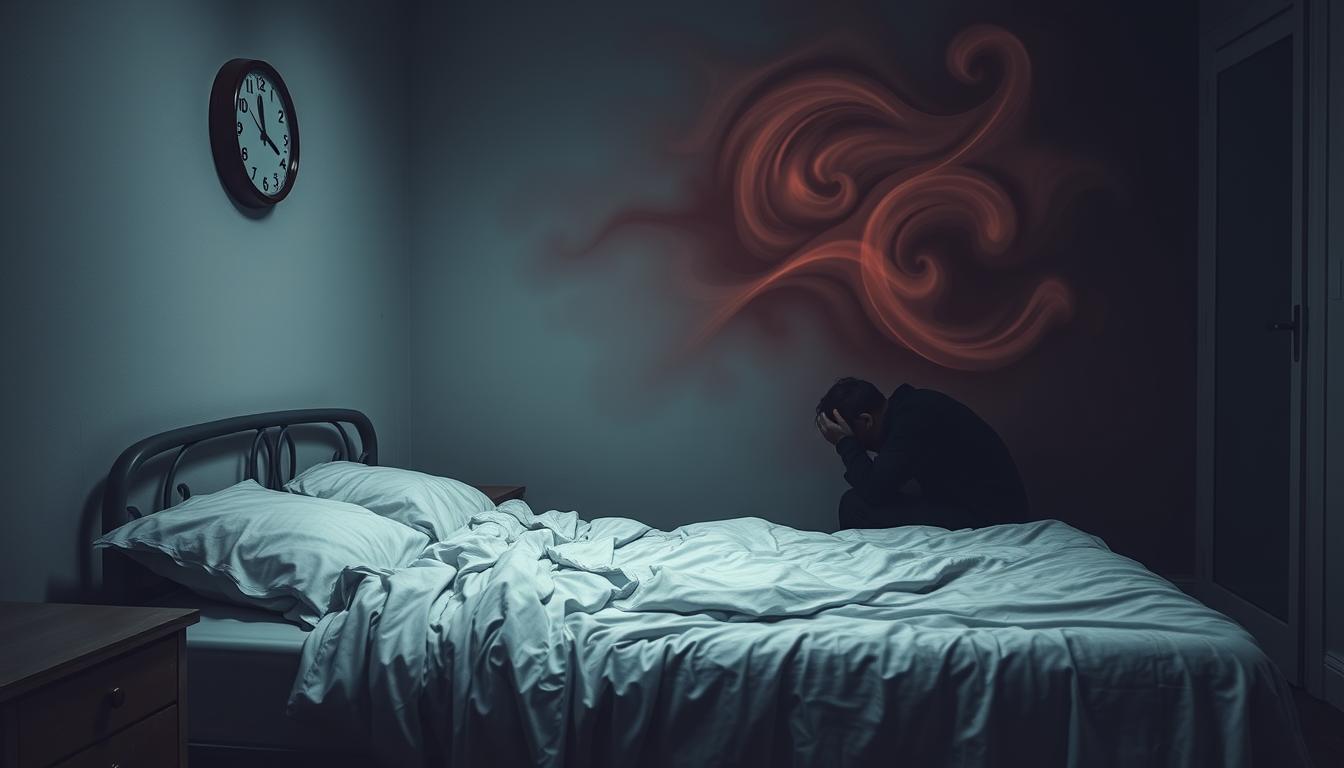Do you often feel sick to your stomach and wonder why? It might be because you’re not sleeping well. Sleep and digestion are closely linked. We’ll look into how sleep affects your stomach and share ways to feel better.
According to the National Institutes of Health, one-third of Americans report not getting enough sleep each night. And while lack of sleep is a common problem, its being widespread doesn’t mitigate its effects.
This lack of sleep may badly affect the attitude, cognitive ability, and judgment of an individual, and also leads to physical sickness. At this point, one may wonder, “Can lack of sleep cause nausea?” Nausea is one of the most common adverse effects due to lack of sleep.
What Is Nausea?
Nausea is a feeling of uneasiness and discomfort in the stomach, which may be followed by a feeling of an urge to vomit. It is not a disease but a symptom of various conditions, ranging from mild to serious.
Nausea is a symptom that can arise from very common causes such as motion sickness, overeating, stress, or intake of spoiled food. It also almost always accompanies infections, migraines, or flu. Pregnancy, especially during the first trimester, is another common trigger for nausea, often referred to as “morning sickness.” The feeling of nausea occurs when the brain’s vomiting center receives signals from the digestive tract, inner ear, or the nervous system.
These may be due to chemical imbalances, changes in hormonal status, or other external factors such as disagreeable odors. Other medications, chemotherapy, and anesthesia may also cause nausea as part of their side effect. The nauseated person usually acts weak and dizzy and has a loss of appetite. Not all cases of nausea will result in vomiting, although the discomforting feeling and disruption in daily activities might prevail.
For nausea, light remedies such as sipping water or ginger tea or bland foods will relieve the condition. Deep breathing and resting in a noise-free area also work well.
Nausea that’s very serious, happens often or extends for more than 24 hours might point to a very grave illness that requires care. Its cause has to be diagnosed to carry out the appropriate treatments.
In cases of dehydration or food poisoning, it is important to seek professional care to avoid complications. Although nausea can be distressing, it is often manageable with simple solutions and lifestyle adjustments.
[Related: How Does Your Sleep Position Affect Sleep Quality?]
Understanding the Connection Between Sleep and Digestive Health
The link between sleep and digestive health is fascinating. It centers secondary images on circadian rhythms. These are our body’s internal clocks that control sleep and digestion.
The Role of Circadian Rhythms in Digestion
Circadian rhythms do more than just control our sleep. They also manage our digestion. This includes making digestive enzymes and moving food through our gut. If these rhythms get messed up, like with lack of sleep nausea, it can upset our digestion.
How Sleep Cycles Affect Stomach Function
Sleep quality and amount affect our stomach. At night, our stomach rests and gets ready for the next day. But, if sleep cycles are broken, it can cause stomach problems like acid reflux and nausea.
The Gut-Brain Axis and Sleep
The gut-brain axis is key in the sleep-digestive health link. It’s the communication between our gut and brain. Problems here can lead to sleep and digestion issues. This shows how important it is to keep these systems in balance.
“The gut and the brain are in constant communication, and this crosstalk is essential for maintaining overall health and well-being.”
It’s important to understand how sleep, circadian rhythms, and digestive health are connected. This knowledge helps tackle lack of sleep nausea and other issues. By knowing these links, we can work on better sleep and digestive health.
Can Lack of Sleep Cause Nausea?
Not many know that not sleeping well can make you feel sick to your stomach. It might seem strange, but research shows it’s true. Not getting enough sleep can make your stomach hurt and feel queasy.
Your body’s clock and how it digests food are closely linked. When you don’t sleep enough, this balance gets upset. This can cause many stomach problems, like nausea.
“Insufficient sleep can cause hormonal imbalances and inflammation, both of which can impair the proper functioning of the digestive system and contribute to nausea,” explains Dr. Sarah Williams, a sleep specialist.
Many studies have found a strong link between sleep-deprived nausea and stomach issues. These include acid reflux, constipation, and even serious problems like irritable bowel syndrome (IBS). Not sleeping well can also mess with how hungry you feel, making nausea worse.
If you keep feeling sick and think it’s because you’re not sleeping, you’re right. Getting enough sleep is key. Try to sleep well, stick to a routine, and manage stress. This can help stop sleep deprived nausea and keep your stomach healthy.
The Science Behind Sleep Deprivation and Stomach Discomfort
Sleep and our stomachs are closely linked. Sleep helps keep our hormones in balance. When sleep is disrupted, our digestion can suffer, causing nausea.
Hormonal Imbalances During Sleep Loss
Not sleeping well can mess with our hormones. Cortisol, the stress hormone, goes up. This can make our stomachs upset. Ghrelin, the hunger hormone, can also get out of balance, making us feel hungrier and uncomfortable.
Impact on Digestive Enzymes
Sleep loss affects our digestive enzymes. These enzymes help break down food and control stomach acid. Without them, we might feel stomach discomfort, acid reflux, and other stomach problems.
Inflammation and Sleep Deficiency
Not sleeping well can make our bodies more inflamed. This inflammation can make stomach problems worse. It’s a cycle that shows how important sleep is for our stomach health.
“Restful sleep is essential for maintaining a healthy digestive system. Disruptions in sleep patterns can have far-reaching consequences, including nausea and other gastrointestinal problems.”
Common Symptoms of Sleep-Related Nausea
Do you often feel sick to your stomach? It could be because you’re not sleeping well. Not getting enough sleep can mess with your stomach. Knowing the signs of sleep-deprived nausea can help you feel better.
Feeling queasy or uncomfortable in your stomach is a big sign. You might feel sick all day, especially when it’s time to sleep. This can also make you not want to eat, which is bad for your health.
You might also feel bloated, have stomach pain, or even throw up. These problems can happen a lot or just sometimes. How often you feel sick depends on how tired you are.
How often and how bad you feel can differ. Some people only feel sick sometimes. Others feel sick all the time. But, fixing your sleep problems is key to feeling better and staying healthy.
How Sleep Deprivation Affects Your Digestive System
Struggling with sleep can hurt more than just your energy. It can also mess with your stomach. Lack of sleep can change how you feel hungry or full. It can even change the good bugs in your gut.
Changes in Appetite Regulation
Not sleeping enough can mess with your hunger hormones. This can make you want to eat more bad foods. You might also feel hungry sooner after eating.
Disruption of Digestive Processes
Sleep loss can slow down your food digestion. This can cause constipation or diarrhea. It can also lower the good enzymes needed to digest food.
Impact on Gut Bacteria
Not sleeping well can change the good bugs in your gut. This can harm your health in many ways. It’s important to keep your gut happy.
Knowing how sleep affects your stomach can help. Try to sleep well, reduce stress, and eat right. These steps can help your gut stay healthy.
The Link Between Insomnia and Gastrointestinal Issues
Ever notice a bad night’s sleep makes your stomach upset the next day? Insomnia and stomach problems are linked. Sleep loss can lead to long-term digestive issues.
Insomnia affects your health in many ways, including your gut. Lack of sleep messes with hormones and digestion. This can cause nausea, pain, and even IBS.
Insomnia and stomach problems go hand in hand. Sleep loss can cause digestive issues. And stomach problems can make it hard to sleep.
To stop this cycle, tackle the causes of insomnia and stomach problems. Good sleep habits, stress management, and healthy eating help. Taking care of your sleep and gut health can improve your life.
Natural Remedies for Sleep-Induced Nausea
If you’ve been struggling with nausea from not sleeping, there are natural ways to help. You can try changing what you eat, relaxing, or using herbs. These methods can help fix the problem and make your stomach feel better.
Dietary Adjustments
Changing your diet can help with nausea from not sleeping. Eat foods like ginger, peppermint, and chamomile. They can make your stomach feel better. Don’t eat heavy, greasy, or spicy foods. They can make nausea worse. Drink lots of water to stay hydrated.
Relaxation Techniques
Relaxing can also help with nausea from not sleeping. Try deep breathing, meditation, or yoga. They can help you relax and sleep better. This can make your stomach feel better too.
Herbal Solutions
Some herbs can help with nausea from not sleeping. Ginger, peppermint, and chamomile are good choices. You can drink them as tea or add them to food. But, talk to a doctor before using them, especially if you have health issues.
Using natural remedies can help with nausea from not sleeping. It’s also important to get good sleep to avoid nausea. Remember, taking care of your sleep is key.
When to Seek Medical Help for Sleep-Related Nausea
If you’re feeling sick because you didn’t sleep well, listen to your body. Sometimes, a little stomach upset can be fixed at home. But, some signs might mean you need to see a doctor.
For example, if you have really bad stomach pain, keep throwing up, or losing a lot of weight, it could be serious. Also, if the sickness keeps you awake or makes you very thirsty, see a doctor.
If you’re always feeling sick and can’t shake it, even with simple fixes, go to the doctor. They can find out why you’re feeling sick and help you feel better.
Your health is very important. If you’re always feeling sick and it’s messing up your life, talk to a doctor. They can help you feel better and sleep better too.
Tips for Better Sleep Hygiene to Prevent Nausea
Good sleep is key for a healthy stomach and to avoid nausea. By improving your sleep habits, you can feel better. Here are some easy tips to help you sleep well and feel good.
Creating an Optimal Sleep Environment
Your bedroom’s feel can really affect your sleep. Make it cool, dark, and quiet. Use blackout curtains or an eye mask for light.
Try white noise or nature sounds to block out loud noises. Also, choose a comfy mattress and pillows for a good night’s sleep.
Establishing a Bedtime Routine
Being consistent helps you sleep better. Create a calm bedtime routine. This could be a warm bath, deep breathing, or reading.
Stay away from screens before bed. They can mess with your sleep and stomach.
Managing Screen Time
Electronic devices can mess with your sleep. Try to use them less before bed. Set a digital limit and find other relaxing things to do at night.
FAQ
Can lack of sleep cause nausea?
Yes, not sleeping enough can make you feel sick to your stomach. It can mess with your digestion and cause nausea.
How does sleep deprivation affect the digestive system?
Not sleeping well can mess with your body’s clock. This clock helps your digestion work right. It can change how you feel hungry, affect your digestive enzymes, and upset your gut’s balance. All these can make you feel queasy and upset your stomach.
What are the common symptoms of sleep-related nausea?
Feeling sick to your stomach, feeling queasy, not wanting to eat, and sometimes throwing up are common signs. How bad and often these happen can vary from person to person.
How can I alleviate nausea from lack of sleep?
To feel better, try changing what you eat, relaxing, and using herbs. Also, make your sleep area comfy and stick to a bedtime routine. This can help a lot.
When should I seek medical help for sleep-related nausea?
If you’re always feeling sick, really sick, or have other bad symptoms, see a doctor. They can find out why and help you feel better. This is especially true if you’re worried about something serious.






